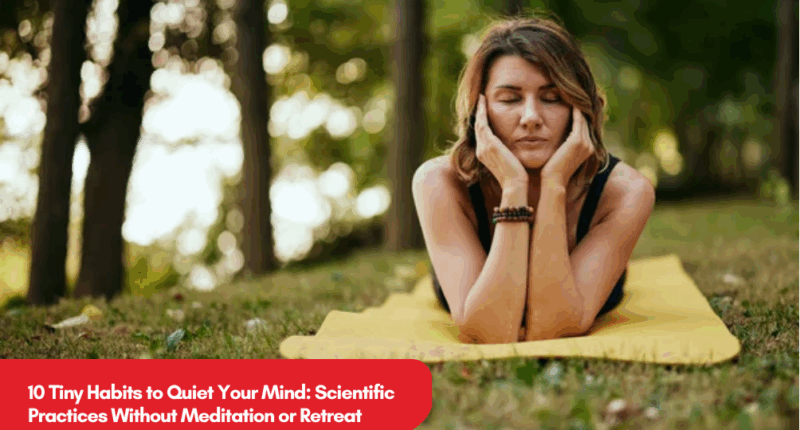In today’s fast-paced and overstimulating world, “10 Tiny Habits to Quiet Your Mind Without Meditation” quieting the mind can feel like an impossible task. Yet, Dr. Michael Hunter, MD, offers a refreshing perspective grounded in science that doesn’t require meditation retreats or hours of mindfulness practice. Instead, he champions small, sustainable daily habits that recalibrate the brain and nervous system, helping individuals regain mental clarity, reduce stress, and enhance focus. This article explores these tiny habits, supported by neuroscience, clinical observation, and practical examples to help anyone foster a calmer, clearer mind.

Why Tiny Habits Matter for Mental Clarity and Brain Health
Overstimulation is a hallmark of modern life. Constant notifications, emails, social media feeds, and daily decisions overload the brain’s capacity for attention and reflection. According to Dr. Hunter, this sensory bombardment disrupts mood regulation, memory consolidation, and overall cognitive function. The solution is not drastic lifestyle changes – a notion supported by psychological research – but small, repeated actions that gently reset the nervous system akin to a daily brain tune-up.
These micro-habits work with the brain’s natural wiring to reduce noise and chaos without demanding extra time or effort. For many, this approach offers an accessible path to quietude and mental resilience amid busy schedules.
Habit 1: Morning Sunlight Exposure to Reset Your Brain Clock
One of the most powerful yet underappreciated practices is getting sunlight within 30 minutes of waking. Natural light exposure helps regulate circadian rhythms by signaling the brain to reduce melatonin production, enhancing alertness and mood for the day ahead. Research indicates that even 10-15 minutes of morning sunlight correlates with improved sleep quality and reduced symptoms of depression, subtly but effectively calming mental clutter.
Habit 2: Start Mornings Screen-Free to Reclaim Focus
Jumping straight into emails or social media can flood the mind with other people’s priorities before one’s own thoughts settle. A brief, intentional period – say 10 minutes – without screens encourages natural thought progression and reduces digital overstimulation. Over time, this tiny habit fosters sustained focus and less mental fatigue.
Habit 3: Write Things Down to Clarify Thoughts
The brain is not designed to store every detail mentally. Writing tasks, worries, or ideas down externalizes them, reducing cognitive load. As Dr. Dawson Trotman phrased it, “Thoughts disentangle themselves when they pass through the lips and fingertips.” Journaling or note-taking can shift scattered thinking into structured clarity, aiding decision-making and emotional regulation.
Habit 4: Declutter Your Physical Space to Clear Your Mind
Physical clutter often mirrors mental clutter; studies show that disorderly environments may increase cortisol levels and impair concentration. Taking just a few minutes daily to tidy a small space – like a desk or drawer – promotes a calmer mental state. This simple act aligns the external environment with a desire for internal calm.
Habit 5: Practice a 60-Second Stress Shift Ritual
Dr. Hunter recommends a brief, focused breathing or grounding exercise that lasts just a minute. Neuroscientific evidence supports that even short mindfulness or controlled breathing sessions activate the parasympathetic nervous system, reducing heart rate and stress hormone levels. This micro-habit can be a quick reset button during moments of overwhelm.
Unfollowing accounts that trigger anxiety or comparison preserves your mental energy. Selectively consuming content that brings joy, inspiration, or peace creates a digital sanctuary rather than a source of stress. This intentional curation prevents unwanted emotional triggers and helps focus on meaningful interactions.
Habit 7: Name One Positive Thing Every Day
Gratitude practices anchor attention to the positive, rewiring the brain to notice good experiences. Writing or mentally acknowledging one good thing daily, even small moments like a kind gesture or a warm meal, reinforces a habit of positivity that gradually quiets anxious or negative rumination.
Habit 8: Create a Digital Sunset for Better Rest
Limiting screen time at least 30 minutes before bed avoids blue light exposure, which interferes with melatonin secretion and restful sleep. A proper wind-down period supports brain recovery and reduces nocturnal mind chatter, improving both sleep quality and daytime cognitive function.
Habit 9: Visual Silence: Embrace Moments Without Visual Input
Periods of intentional visual silence – closing the eyes or sitting in darkness – allow the brain to rest from constant visual stimuli. Neuroimaging research suggests that reduced sensory input activates restorative brain networks, aiding mental reset without effort or devices.
Habit 10: Make Space to Simply Sit Without Agenda
In our productivity-driven culture, doing nothing can feel uncomfortable. However, sitting quietly without distractions facilitates presence and mental spaciousness. This practice lets the mind breathe, gradually decreasing mental noise through gentle awareness rather than active control.
Practical Benefits and Scientific Impact of These Habits
Collectively, these tiny habits form a neuroscience-backed toolkit to counteract overstimulation. They help regulate attention, reduce the stress hormone cortisol, and improve emotional regulation. Clinical observations from Dr. Hunter’s practice reveal patients experience better mood stability, enhanced memory, and increased clarity without quitting their jobs or lifestyle.
Also Read | How to Recover Quickly From a Bad Night’s Sleep










